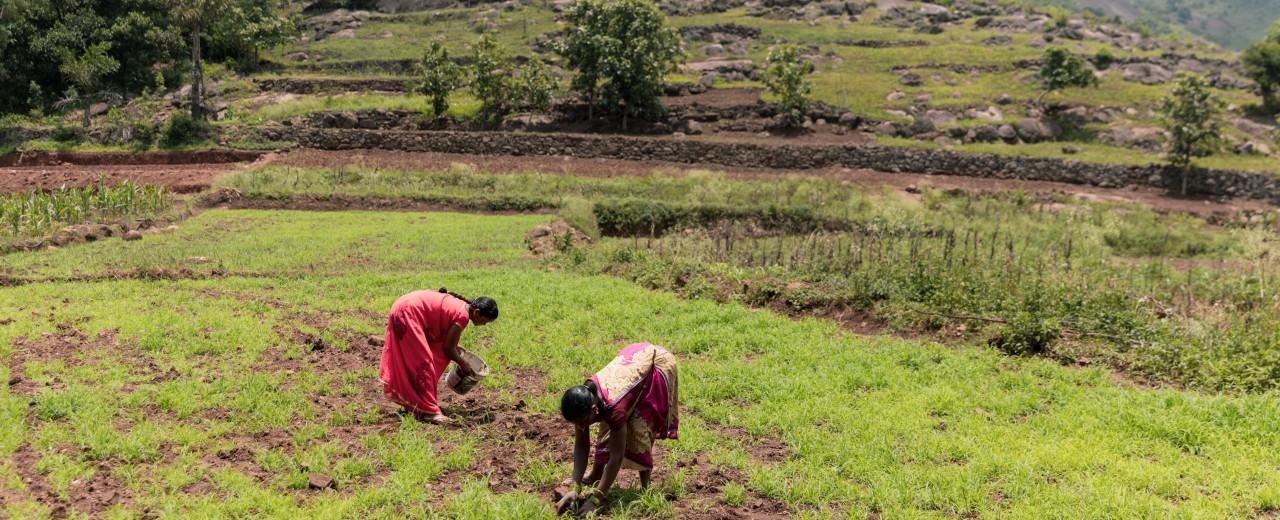
The soils in Andhra Pradesh, India, are drained and depleted. Years of pesticide use and, in some cases, the improper use of fertilisers have destroyed soil life. More than 60% of soils in this Indian state are rated as degraded. This has devastating consequences not only for the environment, but above all for the farmers. A total of 62% of the people in Andhra Pradesh subsist on agriculture, yet many of them are indebted from having to buy fertilisers and pesticides. As a result of climate change, droughts and heavy rainfall are on the rise, causing harvests to fail. This is putting farming families in further distress.
The state of Andhra Pradesh relies on ecological methods to improve the situation of its agriculture and regenerate soils. It specifically promotes a cultivation method called "natural agriculture", which relies on the use of local resources. The plants are fertilised with cow manure, seeds are coated, beds are mulched and plant extracts are used to improve the soil and protect against pests. These methods are not new when taken individually, but India is unique for using them in tandem and they are being further developed at local level.
Natural agriculture promotes soil fertility and plant resilience. A healthy soil can retain more water than a degraded one. Resilient plants are more resistant to diseases and pests. As they develop more roots than in conventional cultivation, it is also easier for them to withstand severe weather events. Smallholder families no longer have to fall into debt because they no longer need synthetic fertilisers or pesticides.
The Indian government’s goal is that all six million farms in Andhra Pradesh will convert to this climate-resilient, natural form of agriculture within the next ten years. KfW has provided a loan of EUR 90 million and a grant of EUR 1 million for the “Andhra Pradesh Climate Resilient Zero Budget Natural Farming” project on behalf of the Federal Ministry for Economic Cooperation and Development (BMZ). These funds are intended to help around 500,000 smallholder farmers switch to natural farming methods by 2027. They are paid according to a “result-based approach”. This means the funds are allocated in each case after previously agreed, verifiable results are achieved. The programme as a whole aims to reach far more families, with 800,000 small businesses having already converted their farming methods.
Women in particular are driving the change in Andhra Pradesh. As many of them do the majority of the agricultural work, trying out the new methods falls to them. Many women are part of self-empowerment groups that help to promote the natural cultivation methods and spread their use throughout the villages.
Nevertheless, there are many reservations surrounding these methods. Near-natural cultivation is often viewed with scepticism. To date, little evidence, scientific or otherwise, has been presented to prove its benefits. This is now about to change. The Indo-German Global Academy of Agroecology Research and Learning (IGGAARL), which was also founded with German assistance, is researching the effects of agroecological cultivation methods on yield, profitability and the security of the food supply.
The efforts of the Indian government and smallholder families have now also been recognised internationally: the sustainable agricultural programme was awarded the Portuguese Gulbenkian Foundation’s Gulbenkian Prize for Humanity in 2024 as one of three winners.
The most important thing remains that the smallholder families can escape their debts and subsist on their harvests.
Share page
To share the content of this page with your network, click on one of the icons below.
Note on data protection: When you share content, your personal data is transferred to the selected network.
Data protection
Alternatively, you can also copy the short link: https://www.kfw-entwicklungsbank.de/s/enzB2bXa
Copy link Link copied